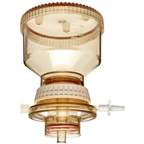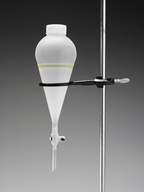Trechters en filtratie
Pyrex™ steunbasis voor filterhouder
Pyrex™ Filter Holder Support Base is a key component used in the assembly of the Pyrex™ 47 mm Membrane Filtration System.
Avignon Ceramic Porcelain Buchner Funnel
This Porcelain Buchner Funnel is designed for rapid filtration and can withstand high temperatures.
Thermo Scientific™ Nalgene™ Utility Funnels
Replace glass lab funnels with these utility funnels, which are an excellent shatter-proof alternative.
Fisherbrand™ Glazen, peervormige scheitrechter met PTFE-afsluitkraan
Gemaakt van chemisch bestendig borosilicaatglas. Fisherbrand™ glazen, peervormige scheitrechter met PTFE-afsluitkraan scheidt mengels tot niet-mengbare oplosmiddelen. Verkrijgbaar met verwisselbare glazen of PTFE-afsluitkraan, maar geleverd met verwisselbare glazen en kunststof stop.
Fisherbrand™ Trechter met korte uitloop van natronkalkglas
Vervaardigd uit natronkalkglas. Fisherbrand™ -poedertrechter van natronkalkglas met korte steel zal minder snel verstopt raken door dikkere substanties.
Fisherbrand™ Glazen trechterfilter met gesinterde glazen schijf
Gemaakt van borosilicaatglas en verkrijgbaar in diverse maten. Fisherbrand™ glazen trechterfilter met gesinterde glazen schijf filtert mediumbezinksels met een poriegrootte van respectievelijk 16 - 40 μm en 10 tot 14 μm.
Fisherbrand™ Trechter van borosilicaatglas
Gewone glazen trechter, vervaardigd uit borosilicaatglas. Fisherbrand™-trechter van borosilicaatglas is ideaal voor vloeistoffen in laboratoriumtoepassingen.
Fisherbrand™ Weegtrechters van borosilicaatglas
Voer poeder in via de slangsteel. Fisherbrand™-weegtrechters van borosilicaatglas zijn ideaal voor het wegen van kleine hoeveelheden poeder.
Pyrex™ glazen Buchner-filtertrechter, diameter 175 mm
Manufactured from chemically resistant Pyrex™ glass. Pyrex™ 175mm Diameter Glass Büchner Filter Funnel with integral sintered glass disc is highly resistant to most corrosive reagents and eliminates the need for filter papers.
DWK Life Sciences DURAN™ Funnel, with long stem, Bunsen Funnel
A funnel enables a clean decanting and filtering of liquids. In addition, the Bunsen funnel has a long handle.
Kartell™ Buchner-trechters van polypropyleen
Vervaardigd van robuust, lichtgewicht polypropyleen voor duurzaamheid en uitstekende chemische bestendigheid. Kartell™ polypropyleen Buchner-trechters met integraal filter zijn ideaal voor het scheiden van vaste stoffen van vloeistoffen in een laboratorium.
Thermo Scientific™ Nalgene™ Reusable Bottle Top Filters
Combine the convenience of a bottle top filter with the savings of a reusable bottle top filter. Screw securely onto glass media bottles with 33 or 45mm neck sizes.
Thermo Scientific™ Filtration Hardware, Accessories, and Spare Parts
Thermo Scientific™ Nalgene™ filtration hardware and accessories can be used in a wide range of applications and in conjunction with our various lines of filtration devices.
Thermo Scientific™ Nalgene™ Büchner Two-Piece Polypropylene Funnels
Separate the lightweight and durable two-piece polypropylene funnels for easy cleaning. These funnels won't chip, crack or break.
Saint-Gobain Chemware™ PFA Funnel
Saint Gobain Performance Plastics™ Chemware™ PFA Funnel is used for ultra-pure liquid transfer in biotechnology applications, environmental analysis, semiconductor and electronic labs.
Pyrex™ trechter voor vacuümfiltratie met Hirsch-patroon en met gesinterde glazen schijf
Vervaardigd van Pyrex™-borosilicaatglas voor hoge bestendigheid tegen chemische corrosie. Pyrex™-trechter voor vacuümfiltratie met Hirsch-patroon en met gesinterde glazen schijf is ideaal voor het filteren van materiaal in semimicrokwantiteiten en maakt filterpapier overbodig.
Lenz Laborglasinstrumente™ Borosilicate Glass Squibb Separating Funnels with Solid Glass Plug
Made of DURAN™ borosilicate glass. Lenz Laborglasinstrumente™ Borosilicate Glass Squibb Separating Funnels with Solid Glass Plug are used to separate two immiscible liquids of different densities
Quickfit™ glazen Buchner-trechter met gesinterde glazen schijf
Gebruikt in plaats van conventioneel filterpapier dat zou worden vernietigd door zuren en alkaliën. Quickfit™ Glass Büchner-trechter met gesinterde glazen schijf is gemaakt van chemisch resistent borosilicaatglas. Integrale verbindingsconus van matglas op steel sluit aan op Quickfit™ Büchner-kolven en -vaten.
Lenz Laborglasinstrumente™ Conische scheitrechters van borosilicaatglas met glazen stop
For use in liquid-liquid extractions to separate components. Lenz Laborglasinstrumente™ Separating Funnels, with Glass Plug, without Scale are manufactured from durable DURAN™ borosilicate glass.
Azlon™ HDPE-trechter voor industrieel gebruik
Gemaakt van polyethyleen en onbreekbaar bij normaal gebruik. Azlon™ industriële HDPE-trechters zijn geschikt voor toepassingen met voedselcontact conform EU- en V.S.-voorschriften. Met rechte bovenranden om morsen te voorkomen.
Vitlab™ Grote trechter van transparant HDPE
Gemaakt van HDPE. Grote Vitlab™-trechter van transparant HDPE is geschikt voor het vullen van grote hoeveelheden vloeistoffen.
Witeg™ Glass Funnel and Stopcock
Provided with a screw-retaining nut.
Fisherbrand™ Long-Stem Analytical Funnels
Molded polypropylene with external ridges and outside ribs to prevent vapor lock
Cole-Parmer™ Stainless Steel Funnel
Stainless steel funnels are a laboratory supply you will count on for years of use.
Fisherbrand™ Porseleinen Buchner-trechter
Excellent for separating liquids from solids in the laboratory. Fisherbrand™ Porcelain Buchner Funnels provide a quick and easy pressure assisted filtration method.
Fisherbrand™ Robuuste/universele trechters
Ideal for continuous lab work and heavy-duty jobs
Fisherbrand™ Conische, glazen scheitrechter met PTFE-afsluitkraan
Vervaardigd van borosilicaatglas en conform ISO 4800-certificering. Fisherbrand™ conische, glazen scheitrechter met PTFE-afsluitkraan wordt geleverd met een glazen en een kunststof stop. Verkrijgbaar met verwisselbare glazen of PTFE-afsluitkraan.
Thermo Scientific™ Nalgene™ Polypropylene Powder Funnels
Transfer powders with these powder funnels. Parallel stem minimizes bridging of powder and external ribbing prevents air locks. A shatter-proof alternative to glass.
Thermo Scientific™ Nalgene™ Large HDPE Funnels
Choose a safer alternative to glass with this shatterproof funnel, featuring external and internal ribbing for air release.
Thermo Scientific™ Nalgene™ Polypropylene Separatory Funnels with Closure
Perform a variety of lab duties with chemically inert, translucent and autoclavable polypropylene separatory funnels.
![]()





























